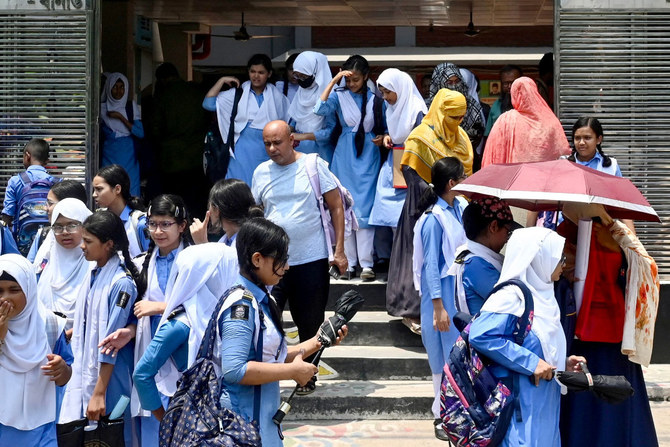Hena Khan, a grade nine student in Dhaka, has struggled to focus on her studies this week as temperatures surpassed 43 degrees Celsius (109 degrees Fahrenheit) in the Bangladesh capital.
“There is no real education in schools in this punishing heat,” she said. “Teachers can’t teach, students can’t concentrate. Rather, our lives are at risk.”
Khan is one of more than 40 million students who have been shut out of classrooms in recent weeks as heatwaves have forced school closures in parts of Asia and North Africa. As the climate warms due to the burning of fossil fuels, heatwaves are lasting longer and reaching greater peaks.
In turn, government authorities and public health experts across the world are increasingly grappling with whether to keep students learning in hot classrooms, or encourage them to stay home and keep cool.
Either decision has consequences. About 17 percent of the world’s school-aged children are already out of school, according to United Nations data, but the proportion is much larger in developing countries with nearly a third of sub-Saharan Africa’s children out of school compared to just 3 percent in North America.
Child test scores in the developing world also lag developed countries.

Heat could exacerbate inequalities, widening learning gaps between developing nations in the tropics and developed countries, experts told Reuters, and even between rich and poor districts in wealthy countries. But sending children to overheated schools could make them ill.
South Sudan already this year closed its schools to some 2.2 million students in late March when temperatures soared to 45 degrees Celsius (113 Fahrenheit). Thousands of schools in the Philippines and in India followed suit in late April, closing classrooms to more than 10 million students.
On Wednesday, Cambodia ordered all public schools to slash two hours off the school day due to avoid peak heat at midday.
Meanwhile, Bangladesh has wavered between opening and closing schools for some 33 million students amid pressure to prepare pupils for exams — even as temperatures climb to dangerous levels.
Many Bangladeshi schools “don’t have fans, the ventilation is not good, and they might have tin roofing which does not provide good insulation,” said Shumon Sengupta, Bangladesh country director for nonprofit Save the Children.
Hot heads
Even if students continue attending classes during heatwaves, their education is likely to suffer.
High temperatures slow down the brain’s cognitive functions, lowering pupils’ ability to retain and process information. US high schoolers, one 2020 study found, performed worse on standardized tests if they were exposed to higher temperatures in the year leading up to the exam.
The research, published in the American Economic Journal, found that a 0.55C (1F) warmer school year reduced that year’s learning by 1 percent. Much of that impact disappeared in schools that had air conditioning, said study co-author Josh Goodman, an economist at Boston University.
Between 40 percent and 60 percent of US schools are thought to have at least partial air conditioning, according to various surveys. Schools without it are often found in poorer districts which already trail their wealthier counterparts academically.
Goodman and his colleagues found similar learning outcomes tied to heat when they looked at standardized test data in other countries. “When (students in) these places experience a year with more heat, they appear to have learned less,” he said.
Other research suggests excessive heat in the tropics can also impact a child’s education even before birth.
Children in Southeast Asia exposed to higher-than-average temperatures in utero and early in life obtained fewer years of schooling later in life, a 2019 study in the Proceedings of the National Academy of Sciences found.
All of this is worrying, Goodman said, because as the world warms, already hot countries shifting to an extremely hot climate will suffer more than temperate countries.
“Climate change will widen the learning gaps between hot and cool countries,” Goodman said. Some developed countries are trying to address the issue.
In March, the US Agency for International Development (USAID) announced it would build 30 heat-resilient schools in Jordan by 2026 “to address the projected increase in extreme heat days in Jordan,” a USAID spokesperson said.
Providing details not previously reported, USAID said it would invest $8.17 million in the schools, using passive cooling systems and air conditioning to help keep schools operating. The number of days that schools are closed for extreme heat has been ticking up in the US, but few countries track such data.
US schools are now canceling class for an average of six to seven school days each year for heat, compared with about three to four days a decade ago, said Paul Chinowsky, a civil engineer who led a 2021 study on schools and rising temperatures for the firm Resilient Analytics.
In Bangladesh last year, schools were closed for 6-7 days, said Save the Children’s Sengupta. “But this year, they are saying it might be closed for 3 to 4 weeks,” he said, as May is often the hottest month in South Asia.



























